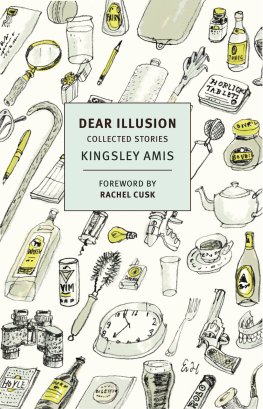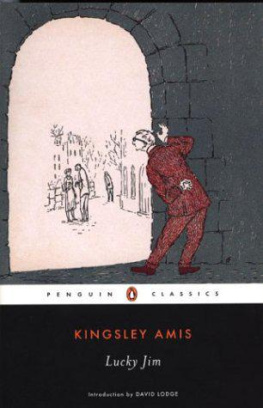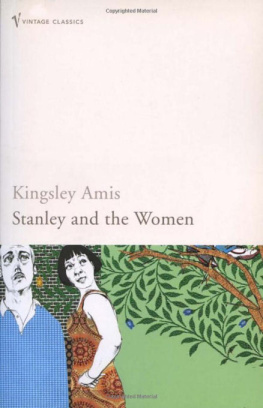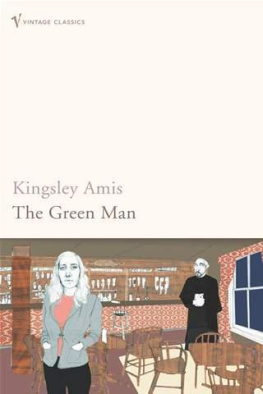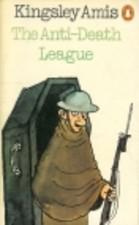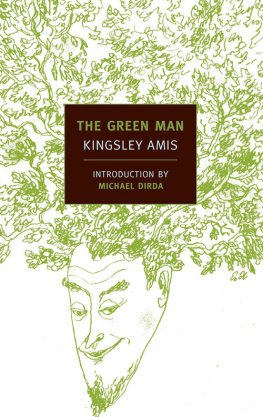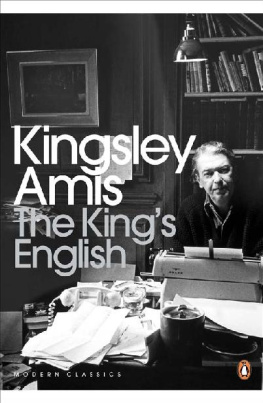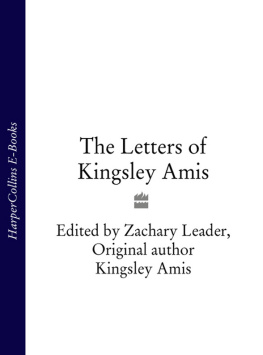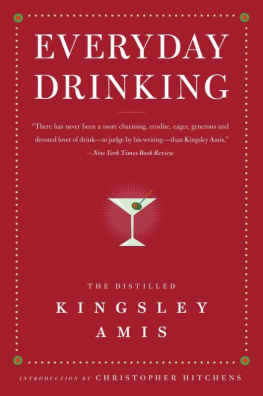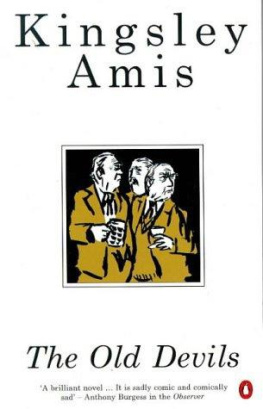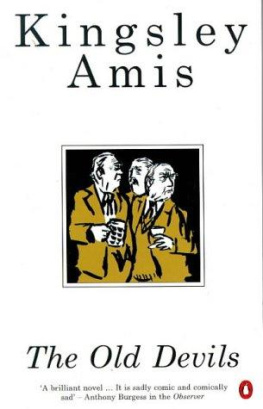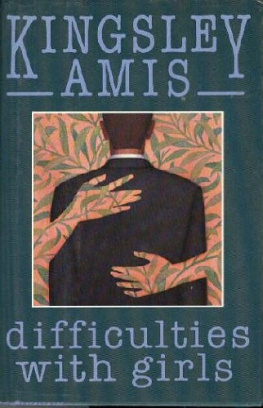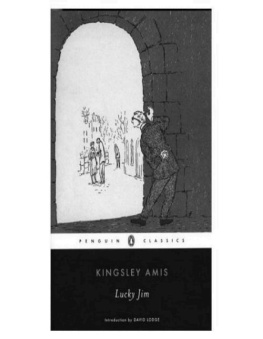Kingsley Amis
Dear Illusion: Selected Stories
KINGSLEY AMIS (19221995) was a popular and prolific British novelist, poet, and critic, widely regarded as one of the greatest satirical writers of the twentieth century. Born in suburban South London, the only child of a clerk in the office of the mustard-maker Colmans, he went to the City of London School on the Thames before winning an English scholarship to St. Johns College, Oxford, where he began a lifelong friendship with fellow student Philip Larkin. Following service in the British Armys Royal Corps of Signals during World War II, he completed his degree and joined the faculty at the University College of Swansea in Wales. Lucky Jim, his first novel, appeared in 1954 to great acclaim and won a Somerset Maugham Award. Amis spent a year as a visiting fellow in the creative writing department of Princeton University and in 1961 became a fellow at Peterhouse College, Cambridge, but resigned the position two years later, lamenting the incompatibility of writing and teaching (I found myself fit for nothing much more exacting than playing the gramophone after three supervisions a day). Ultimately he published twenty-four novels, including science fiction and a James Bond sequel; more than a dozen collections of poetry, short stories, and literary criticism; restaurant reviews and three books about drinking; political pamphlets and a memoir; and more. Amis received the Booker Prize for his novel The Old Devils in 1986 and was knighted by Queen Elizabeth II in 1990. He had three children, among them the novelist Martin Amis, with his first wife, Hilary Anne Bardwell, from whom he was divorced in 1965. After his second, eighteen-year marriage to the novelist Elizabeth Jane Howard ended in 1983, he lived in a London house with his first wife and her third husband.
RACHEL CUSK is the author of two memoirs and seven novels, including The Country Life, The Lucky Ones, and Arlington Park. Her most recent novel, Outline, was published in 2015.
What is todays reader offered by the work of Kingsley Amis? This may not seem an especially pertinent question to ask of a writer who only died in 1995, but in art the recent past can sometimes appear more outmoded and inaccessible than distant history. The living writer is close to the common well of experience; once the writer has died, and can no longer articulate our contemporary world for us, he is exposed to the more brutal judgement of time. What in his work is timeless? What, if anything, makes it worth preserving? Of course, definitive answers to these questions arent always found: dead writers continue to go in and out of fashion, their work suddenly meaningful again in one era then failing to make sense in the next. It is often the most passionately contemporary writers Kingsley Amis was one whose reputations decline most steeply in their absence, for obvious reasons. Relevance becomes irrelevance; the same devotion to the here and now that brought them popularity and fame ensures their obscurity once here and now have become there and then. Yet the observation of ordinary life nearly always forms the cornerstone of great and lasting art. It is the quality of that observation that is put to the test over time, that will determine whether the work is trivial or lastingly true.
Kingsley Amis made his name in the 1950s with the publication of his first novel, Lucky Jim, a work that seemed to define a new era not just in its portrayal of the evolving world of higher education that is its setting but in literary values too, advancing as it did a more youthful and democratic conception of literary style and subject matter that reflected changing modes of social behaviour. In Lucky Jim Amis reprised the black comedy of Evelyn Waugh and re-clothed it in the provincial workaday garb of the ordinary middle classes, and if in doing so he belied something of his artistic seriousness, he was rewarded for it with instant acclaim. His story of a young provincial-university lecturers sufferings at the hands of academic bores, pretentious snobs, prissy disapproving women and spoiled culturally elitist young men was a huge commercial and critical success. It laughed at everyone who needed laughing at in that cramped, class-bound decade; it gave a likeable validity to the new forms of life, to social and sexual freedoms it showed as modest, funny, authentic.
Amis was himself a university lecturer during this period he taught at Swansea, where he lived for many years with his wife and three children and so he knew whereof he wrote. Indeed, the integrity of Lucky Jim, and of Amiss work generally, derives from its autobiographical impulse. Though he wrote assiduously in different forms and genres he considered himself a poet first and a novelist second it is for its hold on unadorned life that his writing was and is esteemed. Yet if Amis kept close to the sources of his own experience, it may partly have been out of a kind of humility, almost a shyness in the face of questions of art. Self-deprecation, usually in the guise of comedy, is a hallmark of an Amis project; humour was his mode of attack and of address. And if humour is also a defence, against, among other things, the accusation that one is taking oneself too seriously, Amis may have relied on his identity as a comic writer to shield him from the larger consideration both private and public of his stature as an artist.
Nowhere is this clearer than in his handling of the short story form, whose particular possibilities for advancing the representation of modern experience he understood and acknowledged while firmly distancing himself from them: the things that only the short story can do, he wrote, the impression, the untrimmed slice of life, the landscape with figures but without characters, make little appeal to me. His own stories, he said, were mere chips from a novelists work-bench. He goes on, more revealingly, to observe that the contemporary short story tends to be published in those pale and sickly present-day equivalents of the Victorian fiction magazines, the periodicals subsidized by the Arts Council or one of its offspring. A writer, or any other kind of artist, who partly or largely need not depend on pleasing the public, who in effect has his fee guaranteed whatever the quality of his product, is tempted to self-indulgence and laziness. Better to stick to the novel, which as yet is unlikely to contain any material subsidized by the Arts Council.
Amiss fear of art being viewed as pretence and the artist as lazy or dependent is clear from these remarks; and who would accuse an artist of being lazy? The answer might be: a working man. With his talk of product and work-benches, Amis is trying to create the image of the writer as an ordinary worker, to dispel arts associations with foppishness and pretentiousness and self-aggrandizement. These associations were evidently painful to Amis but why? It is as though, in the modernist possibilities of the short story, he perceived a threat both to his masculine and his writerly identity; yet for a generation of American male writers emerging contemporaneously with Amis, the short story was a sort of working mans indeed almost a macho form. The story-writer Amis claimed most to admire was Rudyard Kipling: despite being hailed as an innovator with Lucky Jim, Amiss anxiety was after all perhaps that of being thought old-fashioned. As far as the short story was concerned, he may have affixed that label to himself before anyone else could do it for him.
Any reader for whom these stories constitute the first encounter with Amiss work will find them nonetheless to be a sample-case of his qualities as a writer. As his remarks about the short story suggest, he did not take either himself or the form in new directions; instead, he brought to it valuable fragments of his gift, chips from a novelists work-bench. Chief among these is his vigorous observational prose, so assertive and deft and concise:

